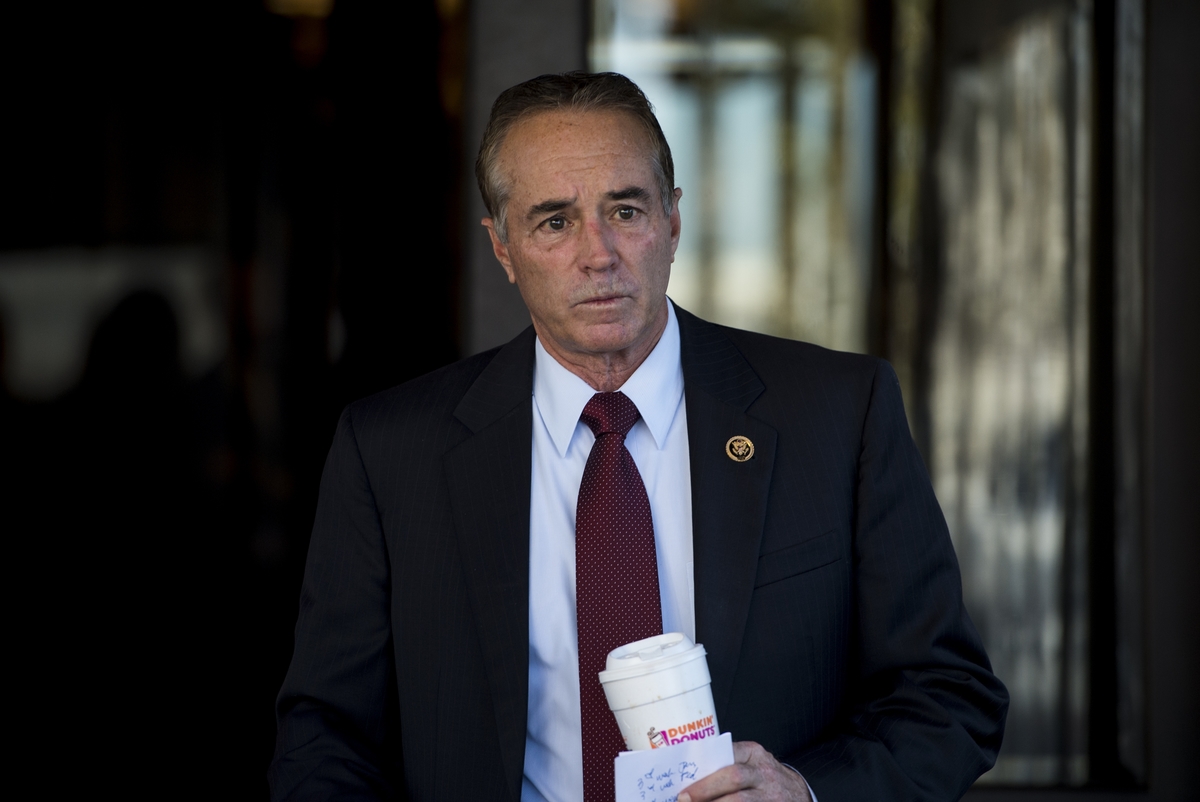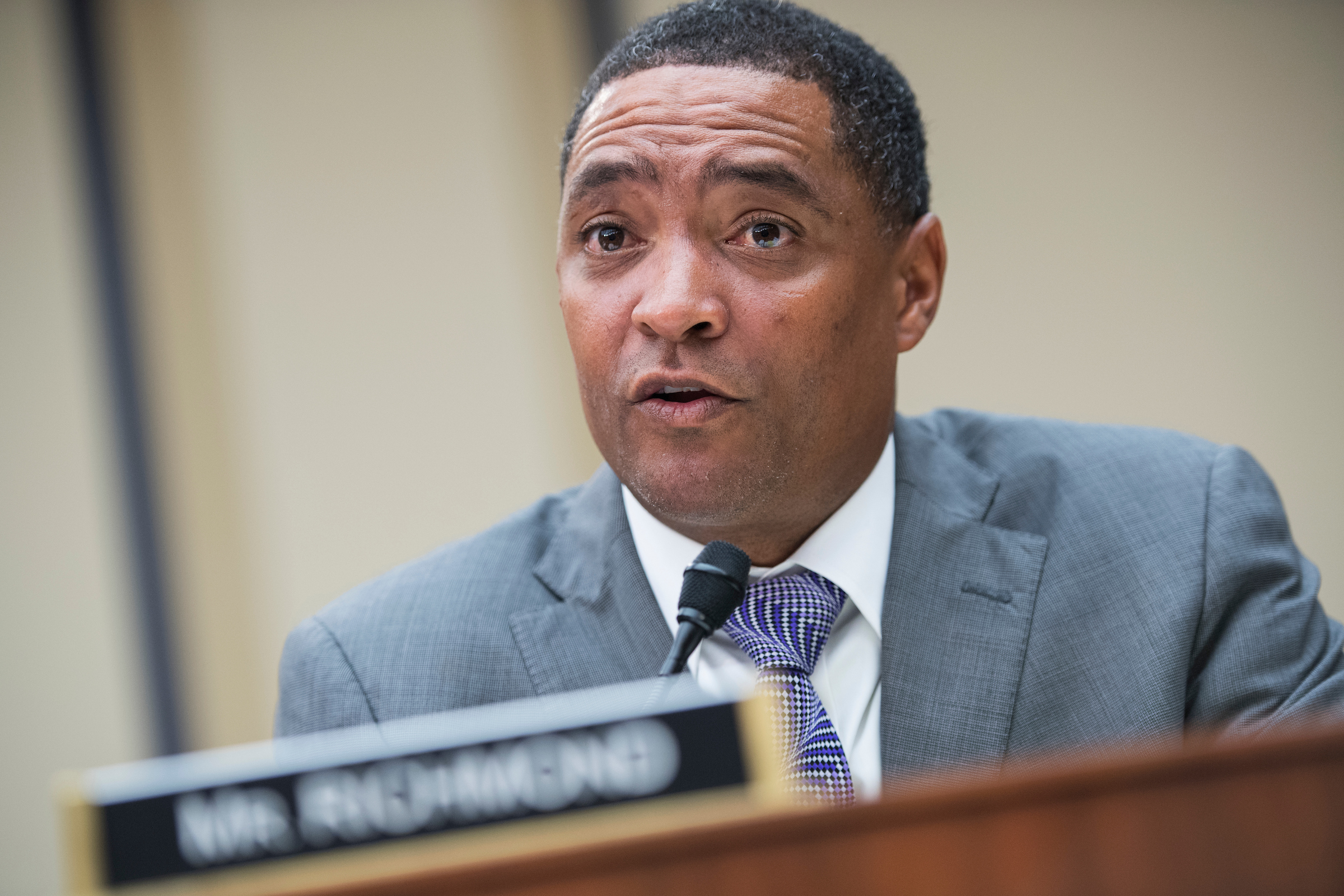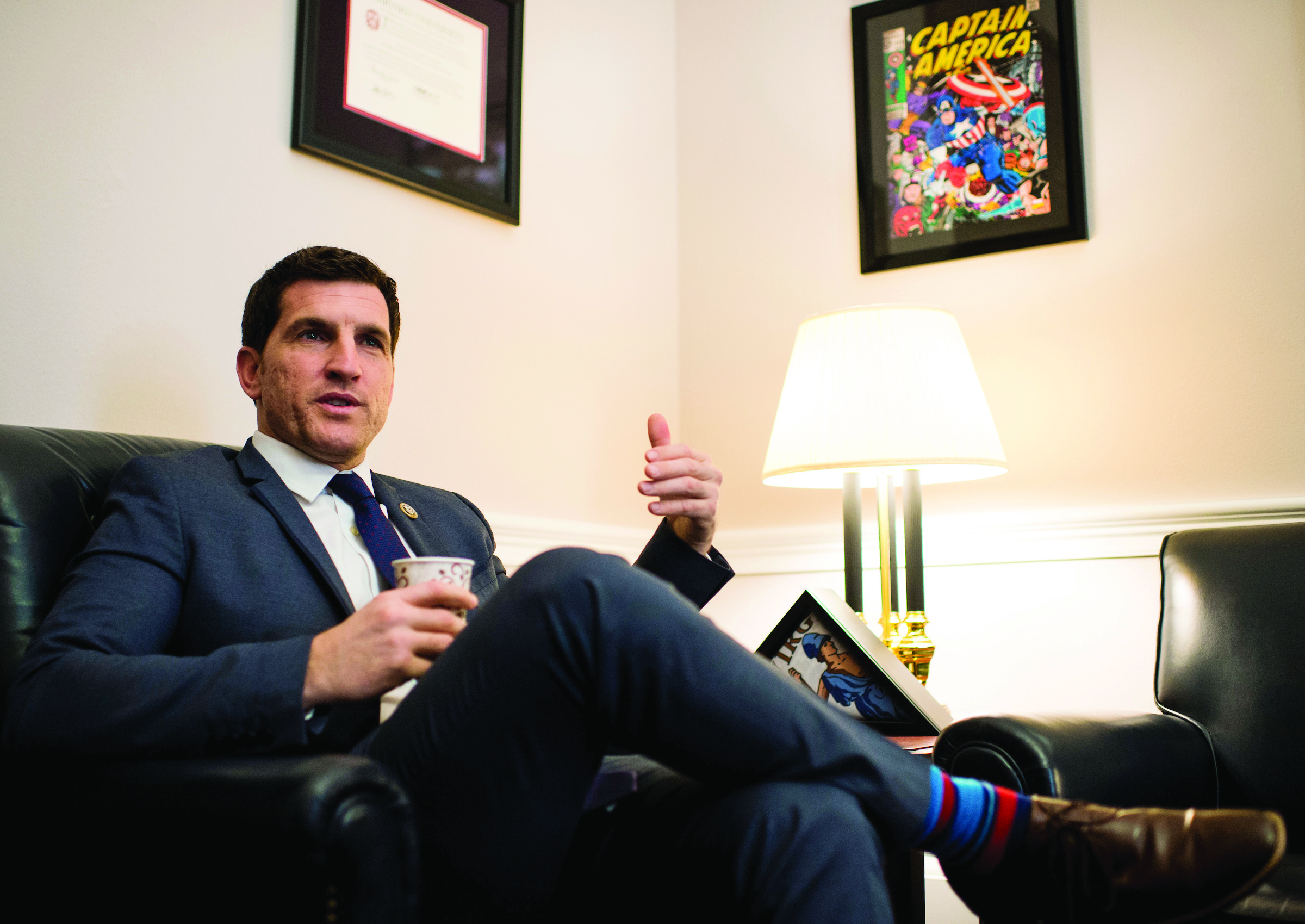Rising Stars 2017: Members of Congress
Four lawmakers to watch

Washington has been turned upside down by the presidency of Donald Trump, but there are many in this city who will now wield power and influence either through their wits, careful planning or just dumb luck.
CQ Roll Call has identified 17 of these people to watch in 2017. Some of the names are familiar, others have recently burst on the scene.
So as the debate continues on a health care overhaul, changes to the tax code, environmental regulations and the business dealings of Trump, keep an eye out for these Rising Stars.
They include members of Congress, congressional and administration staffers, and advocates, and we’ll take a look at them over the course of the coming week.
First, here are four lawmakers to look out for in 2017.
Chris Collins | Cedric L. Richmond | Katherine M. Clark | Scott TaylorThis story first appeared in the March 20, 2017 issue of CQ Magazine.
Rep. Chris Collins, R-N.Y.

BY LINDSEY MCPHERSON
CQ ROLL CALL
In just one year, Rep. Chris Collins has gone from a relatively obscure New York congressman to President Donald Trump’s most visible congressional surrogate.
Collins was the first member of Congress to endorse Trump. Little did he know that just one year later he would be visiting Trump in the White House and talking him up on cable news.
“I didn’t connect any dots, saying ‘OK, if I do this on Feb. 24, 2016, I might be doing this on Feb. 24, 2017,” Collins says.
Reporters now flock to him when they want an interpretation on what the president is thinking. And Collins is on cable TV news a lot.
“We all get up in the morning — some people want to eat vegetables,” Collins says. “I want to go on TV and have an intellectual debate.”
Prior to making his endorsement, the New York Republican had only met Trump once — as part of a small group that met him over dinner in 2014 to discuss whether the billionaire businessman should run for governor. Collins says he doubts Trump even remembers meeting him.
After initially endorsing Jeb Bush, Collins decided to back Trump because of his position on trade and his background as a chief executive; he felt the country couldn’t survive another legislator in the White House. But he didn’t know if Trump, who had been running a campaign centered against the Washington establishment, would welcome his endorsement.
Turns out Trump was thankful to have Collins’ support; he and his team encouraged the New York Republican to promote the endorsement and recruit other members to join the Trump train.
“That gave me the green light to do what we’ve been doing,” Collins says.
Collins, 66, hopes to continue serving as a liaison between the administration and rank-and-file members of Congress. Per the president’s request, he recently organized a meeting with Trump and some of his original supporters at the White House.
The president is interested in sitting down with members regularly and Collins hopes to help coordinate some of those meetings.
Another benefit to Collins’ connections to Trump is the many people he met throughout the campaign who are now members of the administration — relationships he says he can use to advocate issues that are important to his constituents in New York’s 27th District.
“Personal relationships do matter and I’d like to think I have a number of those,” Collins says.
Rep. Cedric L. Richmond, D-La.

BY JASON DICK
CQ ROLL CALL
Rep. Cedric L. Richmond became chairman of the Congressional Black Caucus just a few short weeks after President Donald Trump’s election. To say the 43-year-old Louisiana Democrat has an elevated platform in the Trump era, which has coincided with an uptick of racially motivated violence, animus and proliferation of hate groups, is an understatement at best.
“It’s not merely that the chair of the Congressional Black Caucus is leading a wing of the opposition party. It’s bigger than that. He’s leading an oppositional set of values,” says Cornell William Brooks, president of the NAACP, the nation’s oldest civil rights organization. “These are tough times.”
Indeed, according to the Southern Poverty Law Center, the number of hate groups operating in the United States grew for a second straight year in 2016, from 892 in 2015 to 917.
“The country saw a resurgence of white nationalism that imperils the racial progress we’ve made, along with the rise of a president whose policies reflect the values of white nationalists,” the SPLC’s Mark Potok writes about the group’s annual census of hate groups.
Into these tough times steps Richmond, who presides over the CBC at a time when it has a historically high membership of 49 and is chiefly representative of a more diverse Democratic Party than ever. After being elected chairman, Richmond acknowledged that he owed a debt to the civil rights pioneers of the past, as well as an obligation to fight multi-front battles for economic justice as well.
“I stand on the shoulders of a choir of brave African-American women and men whose struggles made way for our progress,” he said in a statement after winning the chairmanship.
Since then, Richmond hasn’t been shy about speaking up on several issues, from opposing the House Republican health care bill to encouraging Trump to engage with historically black colleges and universities to what he sees as the Democratic Party’s taking African-American voters for granted.
“Many Americans feel vulnerable,” Brooks says. “Congressman Richmond’s voice is needed. … In a check and balance system, he’s a part of a valuable check.”
Rep. Katherine M. Clark, D-Mass.

BY SHAWN ZELLER
CQ ROLL CALL
There will be some Democrats in the House this year who will seek to work with President Donald Trump. Most will resist him, while still others will protest loudly and continuously. Count Rep. Katherine M. Clark among the protesters.
Clark, in her second full term representing suburbs north and west of Boston, isn’t afraid of bold strokes.
When House Republicans held a moment of silence for the victims of the Orlando, Florida, nightclub shootings in June last year, Clark walked out, sick of politicians’ displays of grief unaccompanied by any action. With the help of Georgia Democratic Rep. John Lewis, the civil rights-era icon, she then organized a sit-in that stopped work on the House floor.
“Inaction is a choice,” she said at the time. “Inaction is costing lives.”
Clark, 53, who won her seat in a 2013 special election following Edward J. Markey’s election to the Senate, demanded a vote. She didn’t get one. But the sit-in gained a lot of attention and annoyed House Republicans enough that they passed a rule change at the beginning of the current Congress to fine representatives who use their cellphones to record videos in the House chamber, as the protesters did.
Some of Clark’s Democratic colleagues in the Massachusetts delegation, most notably Seth Moulton, Michael E. Capuano and Stephen F. Lynch, have made it plain they think the Democrats need new leadership. But Clark has stood by Minority Leader Nancy Pelosi, and has a seat on the Democratic Policy and Steering Committee to show for it. She’s also a senior whip and, this year, gained a seat on the Appropriations Committee.
More recently, Clark made a point of skipping Trump’s inauguration and, for the president’s first speech to a joint session of Congress last month, Clark invited an advocate for immigrants as her guest.
Trump’s speech, which did gain faint praise from some Democrats for its more tempered tone, didn’t impress Clark. In response, she raised another protest: “The president’s actions show that he has no intention to live up to his legal responsibility to our Constitution or his moral responsibility to America’s families.”
Rep. Scott Taylor, R-Va.

BY JENNIFER SHUTT
CQ ROLL CALL
The lone House freshman to secure a spot on the Appropriations Committee plans to use his seat to “thread the needle” between lifting a defense spending cap and ensuring military money is spent sensibly.
“I want to give our troops everything they need to be as lethal as possible and to be able to combat threats of today and tomorrow. But at the same time, we have to be responsible, fiscally speaking,” Republican Rep. Scott Taylor says. And if there is a program that “doesn’t make sense, that is essentially obsolete but super expensive,” members need to be honest about its drawbacks, even if it means cutting jobs.
Taylor, 37, who represents Virginia’s 2nd District, says he considers himself both a budget hawk and a defense hawk. His district has one of the largest constituencies of active-duty military members and veterans. He also served in the Navy from 1997 to 2005, including as a Navy SEAL.
To get on the powerful Appropriations panel, Taylor lobbied the steering committee as well as Speaker Paul D. Ryan and Majority Leader Kevin McCarthy.
“The first conversation with the speaker, he said, ‘What do you want to be on? I imagine House Armed Services,’ and I said, ‘Mr. Speaker, I want to be on Appropriations.’ And he said, ‘Freshmen aren’t on Appropriations,’ ” Taylor recalls.
But in the end, “Kevin McCarthy was a big help for us,” Taylor says.
He was assigned to three subcommittees: Legislative Branch, Homeland Security and Military Construction-VA. Taylor is content for now, but hopes to secure a spot on the Defense Appropriations Subcommittee during a future session of Congress.
“For my district and my background that’s probably the most important subcommittee to be on in this body,” Taylor says. “We’ll see how it goes. … I’m pretty confident we’ll get there.”





